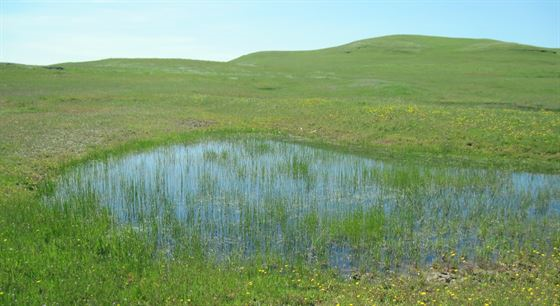SACRAMENTO–Goose Pond Ag, Inc., a Florida corporation, and its manager of operations Farmland Management Services, Inc., an affiliate of the John Hancock Life Insurance Company, have agreed to pay a civil penalty, preserve streams and wetlands, and perform mitigation to resolve violations of the Clean Water Act (CWA) on property near the Sacramento River located in Tehama County, California, the Justice Department announced today.
The property in this case was acquired from Duarte Nursery Inc. and adjoins a Duarte site that was the subject of a settlement agreement announced by the Justice Department in August 2017 and approved by a federal judge on December 7, 2017.
Goose Pond Ag and Farmland Management Services have agreed to pay $5.3 million in civil penalties and mitigation for substantial acres of disturbed streams and wetlands on the property that are connected to the Sacramento River. In addition, the settlement requires the companies to permanently preserve hundreds of acres of streams, wetlands, and buffer areas. The agreement allows the companies to continue using the site for cattle grazing, to apply for a CWA permit to conduct other activities in jurisdictional waters on the site, and to seek future determinations concerning jurisdictional waters at the site.
“Today’s agreement constitutes one of the largest settlements ever reached in a case involving the unpermitted filling of streams and wetlands. Importantly, this result also finally draws to a close another chapter in long-running Clean Water Act litigation involving these properties near the Sacramento River in Tehama County,” said Jeffrey H. Wood, Acting Assistant Attorney General for the Justice Department’s Environment and Natural Resources Division. “Like the Duarte settlement last year, today’s agreement serves the public interest in enforcement of the Clean Water Act and deterrence of future violations.”
“The Corps is satisfied that this enforcement action has been resolved against these companies,” said Michael Jewell, the Chief of the Regulatory Division for the U.S. Army Corps of Engineers’ Sacramento District. “We encourage members of the public to contact the Corps prior to engaging in activities that are regulated under the Clean Water Act. The Corps is always willing to talk to the public about the Regulatory Program and to provide information on jurisdiction, permit requirements, and any other aspects of the Program.”
This case stems from activities these companies conducted after they purchased property that had laid fallow and unfarmed for more than 20 years. Goose Pond bought the 1,500-acre property in 2012 from Duarte Nursery, Inc. for $8.7 million, and shortly thereafter, Farmland Management Services began operating heavy machinery through streams and wetlands as part of the companies’ efforts to convert the property to a walnut orchard. That machinery included “deep rippers” that drag long metal shanks through the ground to break up or pierce highly compacted, impermeable or slowly permeable surface layers, or other similar kinds of restrictive soil layers. The deep ripping in this case destroyed or significantly degraded the streams and wetlands at the site.
Even before Goose Pond’s purchase of the site, the companies received aerial photographs, advice from environmental consultants, and other information that alerted them to federally-protected streams and wetlands on the property. Despite that information, the companies conducted extensive ripping and other activities in streams and wetlands without a CWA dredge-or-fill permit. The settlement agreement reached today secures a significant penalty and mitigation for these violations, while providing fairness for farmers and other landowners who comply with the applicable laws.
Last year, in resolving a related case against John Duarte and Duarte Nursery, Inc., who had conducted unpermitted ripping activities immediately south of the property at issue here, the United States gave assurances that these cases are not (and will not be used as) a pretext for federal prosecution of farmers who engage in normal plowing on their farms. No federal dredge-or-fill permit is required for plowing as defined in the regulations, and no such permit is required for discharges from “normal farming .. activities,” such as plowing, if they are part of an established ongoing farming operation and not for the purpose of converting federally protected waters to new uses. Those protections for farmers remain in the law today and will continue to be recognized.
The proposed consent decree, lodged in the U.S. District Court in Sacramento, is subject to a 30-day comment period and final court approval.



